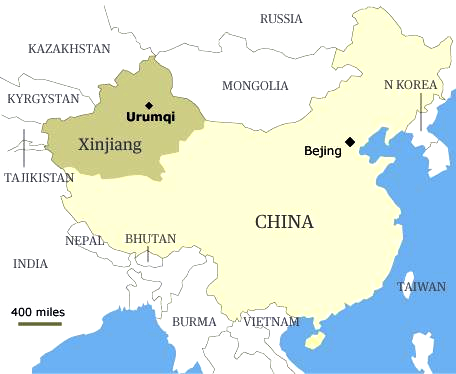International Relations
Uighur Muslims
- 10 Mar 2021
- 5 min read
Why in News
Recently, several hundred Uighur Muslim women in Turkey staged an International Women’s Day march against the extradition agreement of Turkey with China and demanding the closure of mass incarceration camps in China’s Xinjiang Province.
- Earlier in 2020, the United States House of Representatives approved a legislation calling for sanctions on Chinese officials responsible for oppression of Uighur Muslims.
Key Points
- Uighur Muslims:
- The Uighurs are a predominantly Muslim minority Turkic ethnic group, whose origins can be traced to Central and East Asia.
- The Uighurs speak their own language, similar to Turkish, and see themselves as culturally and ethnically close to Central Asian nations.
- The Uighurs are considered to be one of the 55 officially recognized ethnic minority communities in China.
- However, China recognises the community only as a regional minority and rejects that they are an indigenous group.
- Currently, the largest population of the Uighur ethnic community lives in Xinjiang region of China.
- A significant population of Uighurs also lives in the neighbouring Central Asian countries such as Uzbekistan, Kyrgyzstan and Kazakhstan.
- Xinjiang is technically an autonomous region within China — its largest region, rich in minerals, and sharing borders with eight countries, including India, Pakistan, Russia and Afghanistan.
- The Uighurs are a predominantly Muslim minority Turkic ethnic group, whose origins can be traced to Central and East Asia.
- Persecution of Uighurs:
- Over the past few decades, as economic prosperity has come to Xinjiang, it has brought with it in large numbers the majority Han Chinese, who have cornered the better jobs, and left the Uighurs feeling their livelihoods and identity were under threat.
- This led to sporadic violence, in 2009 culminating in a riot that killed 200 people, mostly Han Chinese, in the region’s capital Urumqi.
- Uighur Muslims for decades, under the false accusation by the Chinese government of terrorism and separatism, have suffered from abuses including persecution, forced detention, intense scrutiny, surveillance and even slavery.
- However, China claims its camps to be ‘educational centres’ where the Uighurs are being cured of “extremist thoughts” and radicalisation, and learning vocational skills.
- China claims that Uighur groups want to establish an independent state and, because of the Uighurs’ cultural ties to their neighbours, leaders fear that elements in places like Pakistan may back a separatist movement in Xinjiang.
- Over the past few decades, as economic prosperity has come to Xinjiang, it has brought with it in large numbers the majority Han Chinese, who have cornered the better jobs, and left the Uighurs feeling their livelihoods and identity were under threat.
- China’s Extradition Treaty:
- In December 2020, China approved an extradition treaty with Turkey aimed at strengthened judicial cooperation to facilitate a crackdown on transnational criminals including terrorists.
- Extradition is the formal process of one state surrendering an individual to another state for prosecution or punishment for crimes committed in the requesting country's jurisdiction.
- The extradition agreement comes amidst deepening economic and financial ties between Turkey and China.
- China is also Turkey's leading supplier of Covid-19 vaccines.
- Since 1990, the Uighur diaspora in Turkey has become more vibrant and has attracted widespread attention globally through demonstrations, conferences, meetings and briefings.
- Concerns of Uighur Muslims:
- If Turkey ratifies the treaty, this will be the last nail in the coffin of Uighur culture as China will silence the biggest Uighur diaspora outside Xinjiang.
- The treaty will become another instrument in the hands of China for the prosecution of its enslaved Uighur minority.
- In December 2020, China approved an extradition treaty with Turkey aimed at strengthened judicial cooperation to facilitate a crackdown on transnational criminals including terrorists.
- India’s Stand:
- The Indian government has maintained near silence on the Uighur crisis.
Way Forward
- All the countries should reconsider their position and urge China to immediately stop the persecution of Muslims and the prohibition of Islam in Xinjiang.
- China must close its “Vocational Training Centers,” release the religious and political prisoners from prisons and detention camps. It should adopt multiculturalism and accept the Uighurs and other Turkic Muslims of China as ordinary citizens equal to native Chinese.






-min.jpg)